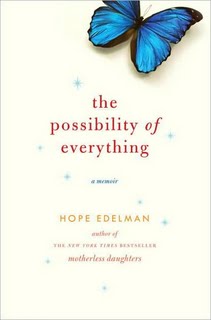Hope is the author of five nonfiction books, including the bestsellers Motherless Daughters and Motherless Mothers.
 The flyer came home in my seven-year-old's school backpack. Her Los Angeles elementary school was planning its annual fundraising dinner, and the school needed parent donations for the silent auction part of the event.
The flyer came home in my seven-year-old's school backpack. Her Los Angeles elementary school was planning its annual fundraising dinner, and the school needed parent donations for the silent auction part of the event.I scanned my office...and came up with a blank. What could a book author donate that could compete with a set visit to Hannah Montana or a pair of drumsticks signed by Tommy Lee? If I were a novelist I could name a fictional character after the highest bidder --- I've seen that offered before --- but my next book, not yet in stores, was a memoir. Most of the names would be real. That was the point.
Then I had an idea: maybe I could auction off eight review copies to a bidder whose book group would be the first to read it. I'd supply the books and the wine and cheese. The winner would supply the readers. They'd get a sneak peek, and I'd get a focus group of sorts. It seemed like a winning proposition for all.
So I filled out the yellow donation. Which is how I later wound up sitting in a Los Angeles living room with the very first book group to read and discuss my new book.
As I sat in the circle with a small plate of cheese and crackers balanced on my thighs, I tried to calm my nerves. That probably sounds disingenuous for a writer on her fifth book. Don't we do these things all the time? Actually, no. My first four books were written specifically for women who'd lost their mothers. They weren't typical book-club selections. In fact, I'd never been invited to a book club as an author before. I truly didn't know what to expect.
How daunting could it be? I asked myself. They'd discuss the book, I'd answer a few questions, and then we'd all go home. I eyed the soft-bound copies they held in their laps. The pages were riddled with typos and mistakes that had since been corrected, but would this group know that? Or would they fixate on the errors, thinking I was a sloppy writer? Would they form opinions about the book based on passages that had already been deleted or reshaped?
I was focusing on the typos to avoid the real question: What would this first group of readers think about the book? I'd taken a risk publishing it, for sure. It's the story of bringing my three-year-old daughter to Maya healers in Belize to get rid of her imaginary friend. Granted, this was Southern California, where an exotic shaman or two doesn't exactly raise eyebrows, but still. It's an unconventional parenting choice by anyone's standards, and this was a room full of moms.
"I have to confess," one of the women began, "that I didn't finish the book..."
My heart sank.
"...because my husband picked it up and started reading it," she continued, "and wouldn't give it back until he was done. So I didn't get to start it until just a few days ago."
A reader liked the book? He'd liked it? He'd liked it! I felt my shoulders relax three inches.
For the next hour, the conversation hopped around from a heated discussion about why I'd whisked my daughter out of a bush doctor's cabin in the rainforest, to a question about how my family members felt about the book. We talked about how I'd originally begun the book as a novel, and how different the story would have been as fiction.
And then a remarkable moment occurred. One of the women said that reading The Possibility of Everything made her want to become a better parent, and I watched as the conversation naturally segued into the more general topic of the kind of mother we each hoped to be, and from there into a spirited discussion about cultural distinctions between spirituality and religion and --- by now leaving the book behind in our dust --- then into a talk about what those terms meant to each of us as mothers and women today.
Whoa. And I'd been obsessing about typos?
Via the unique type of alchemy I'd seen before in college literature classes, the discussion lifted up from the book and entered the realm of larger cultural discourse. The barrier between author and reader vanished. We were just seven mothers talking about subjects that mattered to us. And I suddenly felt ridiculous for having worried about being misunderstood or judged. Because even more than I want my work to be well received --- what author doesn't? --- what I hope for most is for my books to inspire readers to reach for something bigger than my words, even bigger than themselves. To remind us that we're part of the same complicated, glorious, painful, transcendent existence, all searching for meaning together.
It doesn't take a village to accomplish this. It doesn't take a university professor standing at the front of the room. All it takes is a small group of passionate, engaged readers willing to share their innermost thoughts. And this author is grateful that the first book club she attended had the courage to do this, and the generosity to let her join them.
---Hope Edelman

